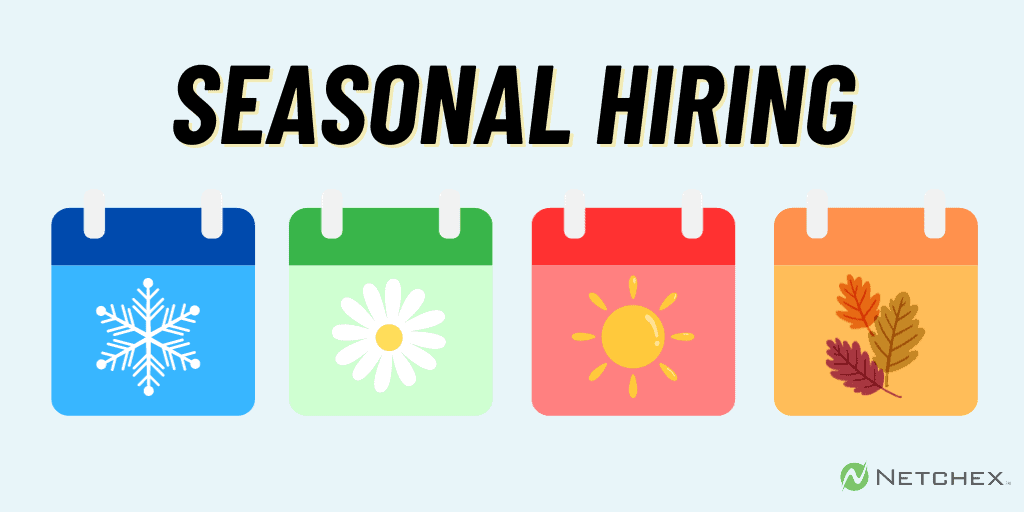Share
Hiring seasonal employees can be a challenge, but the results can make or break your business. Utilize thoughtful planning to turn the increased seasonal workload into even bigger opportunities for your business. Here are several tips to attract the best seasonal employees.
What are seasonal employees?
Seasonal employees are hired to work for a short period of weeks or months, typically during a company’s busiest season. This could be during the holidays, the summer, or another time of year. Naturally, the seasonal demand varies between industries.
Why hire seasonal employees?
Seasonal employees can help you meet increased customer demand during your busiest times. Retail stores may need extra cashiers in the holiday season. Some types of workers, like pool lifeguards, may only be needed during the summer.
Tips for more successful seasonal hiring:
In November 2022, the retail industry filled 256,700 seasonal jobs, the lowest level since 2008, a decline of 26% from 2021. Even if you aren’t looking for a large number of seasonal workers, you’ll want to find the right hires efficiently.
Plan ahead for staffing needs
Advanced planning improves your odds of a successful round of seasonal hires. Estimate how many seasonal employees you will need and start recruiting early.
Reduce time to hire process
The time-to-hire can be slower than you anticipate, especially in a competitive seasonal job market. Reply to applications and schedule interviews quickly. Improve efficiency with software for remote onboarding and an Applicant Tracking System (ATS).
Write clearer job descriptions
Your job descriptions should be clear, concise, and accurate. How long has it been since yours were edited and updated? Be sure to include the following information:
- Appropriate keywords: Use keywords that potential candidates are likely to search for when looking for seasonal work.
- Job expectations: Clearly outline the job responsibilities and requirements. How long will the seasonal job last?
Source candidates wanting seasonal work
Plan recruiting strategies for the long term future, not just the current season. Several weeks from now, instead of just saying “goodbye” to seasonal workers, you should want to be able to say “see you next year!”
- Prioritize returning seasonal employees: Do you have seasonal employees who performed well in the past? Reach out and prioritize hiring them back.
- Build talent pool: Build a talent pool of future seasonal employees by collecting resumes from former employees, retirees, students, and referrals.
Utilize an Applicant Tracking System (ATS)
An ATS can help you streamline the hiring process by automating tasks such as resume screening, scheduling interviews, and sending follow-up emails.
Create a better applicant experience
When hiring seasonal employees, it’s important to create a positive applicant experience. This will help you attract top talent and reduce turnover. Here are a few tips:
- Hire the same way as regular employees: Stay consistent. Follow the same hiring process for seasonal employees as you do for regular employees.
- Be responsive and open: Respond to applicants’ inquiries promptly and professionally. Many applicants compare different options for seasonal jobs. Use pay transparency to make interviews and hiring more efficient.
Screen applicants thoroughly
Seasonal job applicants deserve the same level of scrutiny and vetting. Don’t skip background checks or references for seasonal workers. Seasonal workers can permanently impact how customers and clients view your company.
- Ensure availability: Contact references and move quickly to make sure seasonal workers are available. Verify their eligibility to work in the country.
Offer flexible scheduling
Many seasonal employees are students or professionals with multiple commitments. Flexible scheduling can help you attract and retain top talent. Scheduling software keeps your workers engaged.
Ensure a better onboarding experience
The onboarding experience is important for all employees, including seasonal staff. Provide seasonal workers with the training and resources they need to be successful in their roles.
Stay in touch
Once your seasonal employees have completed their contracts, stay in touch with them. You should strive to build a pool of qualified candidates for the years ahead. Consider sending them occasional email updates or connecting with them on LinkedIn.
- Offboarding and exit interviews: When seasonal employees complete their contracts, go through your whole offboarding checklist. Use exit interviews to get honest feedback on the hiring process and the employee’s experience.
- Ask great employees to stay on or return next year: When your seasonal employees include star talent, encourage them to come back. Do you have any year-round job openings that might attract them to join the team?
Hiring seasonal employees might be necessary for your business to survive high seasonal demand, but it’s important to remember the big picture. Especially for Human Resources, the staff you hire can make a lasting impact on company culture. Even if they won’t be around in six months or a year, the people you hire this season can change the direction of the company.
Discover how Netchex can help you better recruit seasonal employees:
Industry news & tips sent straight to your inbox!
Enter your email below to subscribe to industry news, product updates, and tips.
Related articles

Hiring Pitfalls to Avoid in 2026

Top 3 Reasons Why Your Hiring Process Isn’t Working (And How to Fix It)

Hotel Seasonal Staffing: Strategic Workforce Management for Peak and Off-Peak Periods

